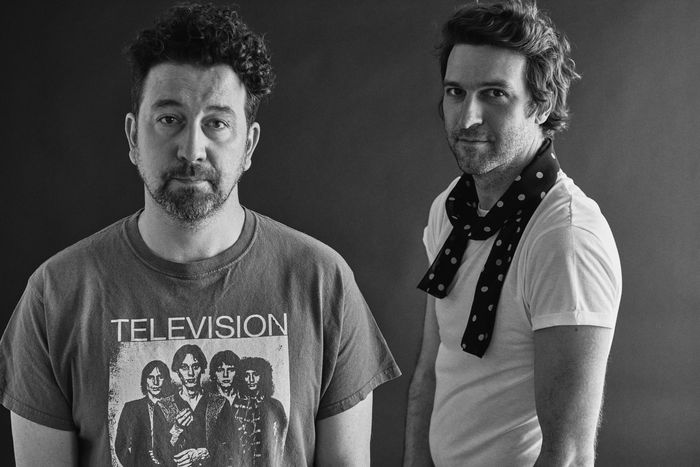album review
This Is Not How to End Your Band

For nearly a decade, Brian King and David Prowse’s Japandroids were the ideal postrecession rock group. They were two college friends on a mission to manifest “The Boys Are Back in Town” vibes with scrappy punk energy. The duo’s first two albums, 2009’s Post-Nothing and 2012’s Celebration Rock, felt tailor-made for a demographic raised on Our Band Could Be Your Life. But after a more experimental third record — 2017’s Near to the Wild Heart of Life, which added synths and acoustic guitars to the formula — and a massive tour, they went silent. When they canceled their next performance, a 2022 gig at Shaky Knees Music Festival, it began to feel as if Wild Heart would be their final act. While there are worse fates in life than making an indie-rock Return of the Jedi and calling it a day, this past July, Japandroids returned with a surprise announcement: Their actual last album, Fate & Alcohol, was coming this fall. In an interview with NPR, Prowse hinted at an amicable end to the band owing to King’s sobriety along with touring fatigue and being a new father. “I’m supportive of Brian,” he said. “I’m glad he’s a happier and healthier person today than he has been at some points in the past. And if that means the end of this band, so be it.”
There’s always hope a final record will serve as a worthy good-bye. Unfortunately, the just-released Fate & Alcohol feels like a lazy retread of better Japandroids albums. The new tracks have the same building blocks of the previous three — distorted guitars, frantic drumming, We have only one night left to live, and we’re gonna drink with our friends!!! lyrics — but lack the left-field experiments of Wild Heart or the cathartic energy of Post–Nothing and Celebration Rock. King and Prowse’s aggressively earnest songs used to turn a night out at your local bar into a Shakespearean rage against the dying light. But with Fate & Alcohol, they’re not raging against anything, and that passionate, life-affirming strain they used to hit in their high notes is gone. For the first time, Japandroids sound bored.
Unlike the duo’s previous efforts, which kick off with slow and powerful instrumentals, opener “Eye Contact High” sees King speed through a series of rock clichés, as if he’s trying to sing as quickly as possible to distract us from his cringey lyrics (“I careened around the corner, saw the 505 / Looking for you, baby, but blinded by the light / The night was numbing, ain’t no one left / Just me, the city, and a cigarette”). While the music used to mask some of this awkwardness, the mixing on Fate & Alcohol pushes the instruments under the vocals. By taking power away from the guitar and drums, King’s voice sounds too clean, the previous edge having vanished. It happens again on “D&T” with his generic lines a little too front and center.
In the rare moments the album clicks, it feels like a parody of Japandroids. “Alice” has the same slow-burn thrill as “Sovereignty” without the satisfying climax. “Upon Sober Reflection” starts like an engaging impression of “Younger Us” until the duo pump the brakes for a chorus that cuts the tempo almost in half, as if King and Prowse are worried they’re moving too fast. And the tame guitar riff on lead single “Chicago” — which seems primed to soundtrack a future fight between Carmy and Richie on The Bear — comes across as a lazy remix of 2012’s “Continuous Thunder” (“Alice” reuses the same template to even worse results).
If this were simply another Japandroids album, these sins would feel less glaring. But it’s confounding to think that, after 15 years, King and Prowse are okay being sent off with something like “Positively 34th Street,” in which King — perhaps in an attempt to challenge himself to try something new — clumsily sings from the perspective of a woman. By closing track “All Bets Are Off,” it sounds as though the duo just want to get things over with, limping to the finish line as the song ends mid-riff.
Beloved final albums are tricky, but they’ve been accomplished before. For every White Stripes Icky Thump — a record that successfully builds on what made a band special in the first place and showcases something new — there’s a bland, deflated bookend like Creedence Clearwater Revival’s Mardi Gras. While there is some consolation to a beloved group finishing on its own terms — it’s better than having an ugly breakup! — without a distinct identity, Fate & Alcohol gives the impression that the duo could never figure out how to evolve beyond their sophomore album. Rather than fading into the sunset, Japandroids have awkwardly fizzled out.
This Is Not How to End Your Band
Things you buy through our links may earn Vox Media a commission.

Leave a Comment